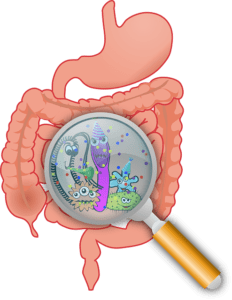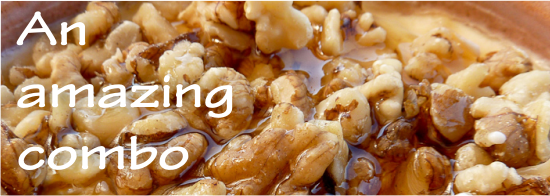“Can I take honey in diarrhea?”
“Yes, absolutely.”
“That sweet liquid?”
“Science says that. Not me.”
Gastroenteritis is an acute inflammation of the gastrointestinal tract that may be caused by a variety of factors, and honey, with its anti-inflammatory and antimicrobial effects helps in treating it. A fact that is more and more recognized by science, through new studies and clinical trials.
Among the factors that cause diarrhea: infectious agents, certain medications, plant and animal toxins, gastro-intestinal disorders and substances that increase gastrointestinal tract secretions. As difficult as it may seem to believe, diarrheal diseases are one of the major causes of mortality and morbidity in the world, especially in developing countries. Diarrhea accounts for more than 5~8 million deaths each year, mainly in infants and children under 5 years old.
Diarrhea in toddlers:
• A clinical trial made in 2019, named “The Effect of Honey with ORS and a Honey Solution in ORS on Reducing the Frequency of Diarrhea and Length of Stay for Toddlers.“, conducted by Andayani RP and colleagues from Indonesia, analyzed the effect of honey with an oral rehydration solution (ORS) and a honey solution in ORS on the frequency of diarrhea and length of hospital stay for toddlers with diarrhea.
The trial involved 72 toddlers, aged 1-5, who were affected by diarrhea. The results showed that 10 ml of honey added to an oral rehydration solution (ORS) at every diarrhea episode, reduced the frequency of diarrhea and length of hospitalization.
Diarrhea in infants and children (up to 8yo) with gastroenteritis:
• A similar study was done in 2010, on 100 children with acute gastroenteritis aged 1.1 – 8, who were separated in 2 groups: Group I received oral rehydration solution (ORS) (control), and Group II received ORS with honey. As expected, in the honey-treated group the frequencies of vomiting and diarrhea were significantly reduced compared to the control group. Additionally, the recovery time till normal soft stools was significantly shortened.
As same conclusion is drawn: “In conclusion, honey added to ORS promoted rehydration of the body and sped recovery from vomiting and diarrhea.”
• Other earlier study, “Honey in the treatment of infantile gastroenteritis.“, by Haffejee IE and Moosa A., used honey in oral rehydration solution in infants and children with gastroenteritis. The results showed that honey shortens the duration of bacterial diarrhoea, does not prolong the duration of non-bacterial diarrhoea, and may safely be used as a substitute for glucose in an oral rehydration solution containing electrolytes.
Diarrhea in very ill patients:
• A 2018 study “Effect of Honey on Diarrhea and Fecal Microbiotain in Critically Ill Tube-Fed Patients: A Single Center Randomized Controlled Study.” by Vahdat Shariatpanahi Z and colleagues, evaluated the effect of honey in enteral diet during occurrence of diarrhea and fecal microbiotain, in critically ill patients.
In this trial, a group of patients received a high protein kitchen enteral diet and the study group received honey as 10% of its carbohydrate intake.
After 7 days, in the honey group there was a considerable reduction in diarrhea. The scientists’ conclusion was that “Enteral nutrition with honey might reduce the length of stay at the ICU and development of organ failure in critically ill patients. It seems that honey helps reduce the incidence of diarrhea.”
• A 2019 study “Antidiarrheal, Analgesic, and Anthelmintic Activities of Honeys in the Sundarbans Mangrove Forest, Bangladesh.” by Islam MR et al., Bangladesh, evaluated the antidiarrheal, analgesic, and anthelmintic activities of honey samples from the Sundarbans mangrove forest of Bangladesh.

Mangrove honey is the most affordable honey found in South-Asian countries, especially in Bangladesh and India. The mangrove shrub is one of the fewest shrubs that tolerate salted waters! (see black mangrove honey). The world’s largest contiguous tract of mangroves forest is Sundarbans, located in the South-Western regions of Bangladesh, which produce honey of an excellent quality, with a high content of polyphenols and antioxidants. More than 200 metric tons of honeys each year!
For this study, scientists used Young Swiss albino mice, which were induced diarrhea using castor oil. The control group received distilled water containing 0.1% Tween-80; the PC received loperamide [3 mg/kg body weight (b.w.)]; the test groups received the fractions and raw honey (RH) at varying concentrations (100~500 mg/kg b.w).
At a dose of 250 mg/kg, all the fractions and RH significantly (P<0.05 vs. control, calculated using the Student’s t-test) inhibited castor oil-induced diarrhea in mice.
Diethyl ether showed the highest rate of inhibition (47%), followed by raw honey (44%), distilled water fractions (38%), ethanol (30%), and methanol (12%). Loperamide (PC, 3 mg/kg), an antidiarrheal drug, showed 47% inhibition.
(Methanol, ethanol, and ethyl acetate are extracts from honey that potentially inhibit growth of pathogenic bacteria that lead to food spoilage.)
The results of the study revealed that honeys produced in the Sundarbans have antidiarrheal, analgesic, and anthelmintic activities. Regular consumption of the honey may therefore prevent diarrhea, pain, and helminth diseases.
• A 2018 review, Role of Honey in Topical and Systemic Bacterial Infections, conducted by Hussain MB from King Abdul Aziz University , Jeddah, Saudi Arabia, summarizes different antibacterial bio-active compounds in honey, their synergistic interaction and their clinical implications in topical and systemic infections.
The conclusion remains: honey is considered one of the potential candidates for treatment of diarrhea because it contains a natural combination of probiotics, prebiotics, and zinc.
 Diarrhea with E. Coli and honey
Diarrhea with E. Coli and honey
• an early study from 2005, Effect of natural honey on local isolates of diarrhea-causing bacteria in southwestern Nigeria, by Tinuola T. Adebolu, investigated the effect of natural honey on diarrhea-causing bacteria in southwestern Nigeria: Escherichia coli, Campylobacter jejuni, Salmonella enterocolitis and Shigella dysenteriae.
The results showed that the inhibitory effect of the honey samples on E. coli was comparable to that of amoxycillin (20.0 mm) and chloramphenicol (17.0 mm).
• Other earlier study, “Honey in the treatment of infantile gastroenteritis.“, by Haffejee IE and Moosa A., used honey in oral rehydration solution in infants and children with gastroenteritis. The results showed that honey shortens the duration of bacterial diarrhoea, does not prolong the duration of non-bacterial diarrhoea, and may safely be used as a substitute for glucose in an oral rehydration solution containing electrolytes.
Are there specific honeys that are better for diarrhea?
Some studies were done using specific monofloral honeys, that is why they are classified accordingly:
– for diarrhea: apple honey, blackberry, red clover, oregano, Moroccan oregano honey.
– for constipation: honeydew honey (Oligosaccharides from honeydew honey have prebiotic activity), oak, coriander, sidr honeys, loquat honey.
Traditionally, it is also known that old honeys are good to treat diarrhea and fresh honeys are good for constipation. Fresh means in the first 3 months after harvest. It’s good to know. 🙂
We usually have more old honeys at home, rather than fresh, so, yes, we can take honey in diarrhea treatment.
Pictures’ source: Pixabay.com




